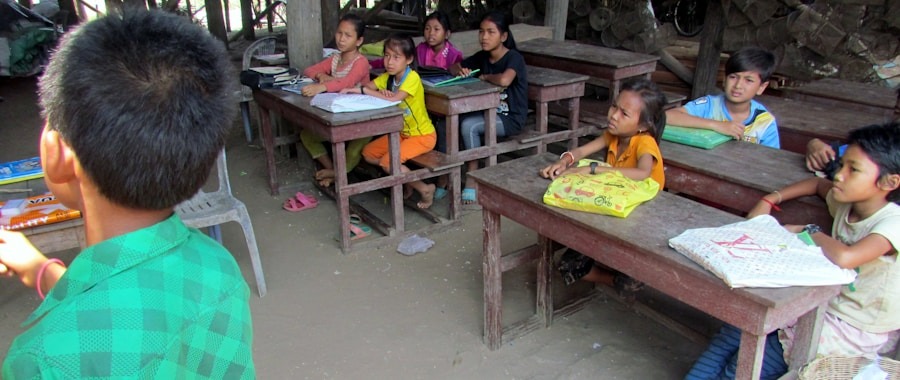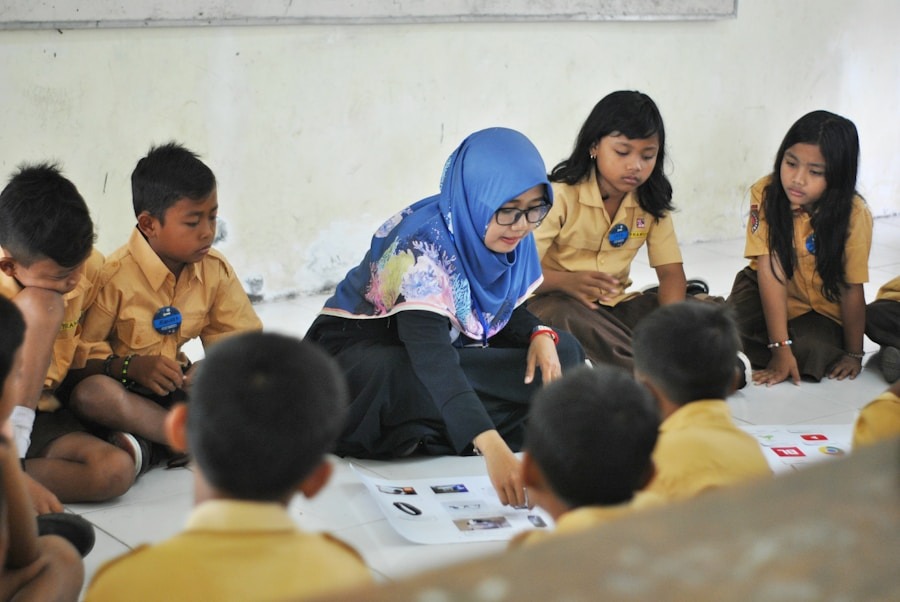Education serves as a cornerstone for individual development, shaping not only knowledge but also character and critical thinking skills. From early childhood through adulthood, the educational journey equips individuals with the tools necessary to navigate the complexities of life. It fosters cognitive abilities, enhances problem-solving skills, and cultivates creativity.
For instance, a child who engages in early literacy programs is more likely to develop strong reading and writing skills, which are foundational for future academic success. This early exposure to education can significantly influence a person’s self-esteem and confidence, enabling them to pursue further learning opportunities and personal growth. Moreover, education plays a pivotal role in developing emotional intelligence and social skills.
Through collaborative learning experiences, individuals learn to communicate effectively, work in teams, and resolve conflicts. These interpersonal skills are essential not only in personal relationships but also in professional environments. For example, a student participating in group projects learns to appreciate diverse perspectives and negotiate differing opinions, which are invaluable skills in today’s globalized workforce.
The ability to empathize with others and understand various viewpoints is often cultivated through educational experiences, making education a vital component of holistic individual development.
Key Takeaways
- Education is crucial for individual development as it equips individuals with knowledge, skills, and values necessary for personal growth and success.
- Education plays a significant role in social development by promoting equality, tolerance, and social cohesion within communities and societies.
- The advancement of a nation is closely linked to the quality of its education system, as education contributes to the development of human capital and the overall progress of the country.
- There is a strong correlation between education and economic development, as education enhances productivity, innovation, and competitiveness in the workforce.
- Education influences cultural and moral development by shaping individuals’ beliefs, values, and behaviors, and promoting cultural diversity and ethical principles.
- While education presents opportunities for development, it also faces challenges such as access, quality, and relevance, which need to be addressed to ensure inclusive and sustainable development.
Education’s Impact on Social Development
The influence of education extends beyond the individual, significantly impacting social development within communities and societies. An educated populace tends to be more engaged in civic activities, such as voting and community service, which fosters a sense of responsibility and belonging. For instance, studies have shown that higher levels of education correlate with increased participation in democratic processes.
Individuals who have received a quality education are more likely to understand their rights and responsibilities as citizens, leading to a more informed electorate that can advocate for social change. Furthermore, education serves as a powerful equalizer in society. It has the potential to break the cycle of poverty by providing individuals from disadvantaged backgrounds with opportunities for upward mobility.
Programs aimed at increasing access to education for marginalized groups can lead to significant improvements in social equity. For example, initiatives that provide scholarships or mentorship programs for underprivileged youth can help bridge the gap between different socioeconomic classes. As these individuals gain access to quality education, they are better equipped to contribute positively to their communities, thereby fostering social cohesion and reducing inequality.
The Role of Education in National Development

At the national level, education is a critical driver of development and progress. Countries that prioritize education often experience enhanced economic growth, improved health outcomes, and greater political stability.
Nations that invest in education tend to attract foreign investment and create jobs, as companies seek skilled labor to drive their operations. For instance, countries like Finland and Singapore have made substantial investments in their education systems, resulting in high levels of academic achievement and economic prosperity. Additionally, education contributes to national development by promoting social stability and reducing crime rates.
Educated individuals are less likely to engage in criminal activities, as they have better employment prospects and a greater understanding of the law. This correlation between education and crime reduction is evident in various studies that show lower crime rates in areas with higher educational attainment. By fostering a culture of learning and critical thinking, nations can cultivate responsible citizens who contribute positively to society, thereby enhancing overall national development.
The Relationship between Education and Economic Development
The relationship between education and economic development is multifaceted and profound. Education enhances human capital by equipping individuals with the skills necessary for the labor market. A well-educated workforce is more productive and adaptable, which is crucial in an era characterized by rapid technological advancements.
For example, industries such as information technology and renewable energy require a skilled workforce capable of navigating complex systems and innovating solutions. Countries that invest in education are better positioned to harness these opportunities for economic growth. Moreover, education drives innovation by fostering research and development.
Higher education institutions play a vital role in advancing knowledge through scientific research and technological advancements. Collaborations between universities and industries can lead to groundbreaking discoveries that fuel economic progress. For instance, Silicon Valley’s success can be attributed in part to the strong educational institutions in the region that produce highly skilled graduates who drive innovation in technology.
As nations prioritize education, they not only enhance their economic prospects but also position themselves as leaders in the global economy.
Education’s Influence on Cultural and Moral Development
Education profoundly influences cultural and moral development by instilling values, ethics, and cultural awareness in individuals. Through exposure to diverse perspectives and ideas, education fosters an appreciation for cultural diversity and promotes tolerance. In multicultural societies, educational curricula that include global history, literature, and arts can help students understand different cultures and traditions, thereby nurturing respect for others.
This cultural competence is essential in an increasingly interconnected world where cross-cultural interactions are commonplace. Furthermore, education plays a crucial role in moral development by encouraging critical thinking about ethical dilemmas and societal issues. Through discussions on topics such as justice, equality, and human rights, students learn to navigate complex moral landscapes.
This experiential learning fosters a sense of empathy and social responsibility, shaping individuals who are not only knowledgeable but also committed to making ethical choices that benefit society.
Challenges and Opportunities in Education for Development

Despite its undeniable importance, the field of education faces numerous challenges that hinder its potential for fostering development. Access to quality education remains a significant barrier for many individuals worldwide, particularly in low-income countries where resources are scarce. Issues such as inadequate infrastructure, lack of trained teachers, and insufficient funding can severely limit educational opportunities for children and adults alike.
For instance, UNESCO estimates that over 260 million children are out of school globally, highlighting the urgent need for targeted interventions to address these disparities. However, these challenges also present opportunities for innovation and reform within educational systems. The rise of technology has opened new avenues for learning through online platforms and digital resources.
E-learning initiatives can reach remote areas where traditional schools may not be accessible, providing flexible learning options for students of all ages. Additionally, partnerships between governments, non-profit organizations, and private sectors can lead to innovative solutions that enhance educational access and quality. For example, initiatives that leverage mobile technology to deliver educational content can empower learners in underserved communities.
In conclusion, while challenges persist within the realm of education, the potential for transformative change remains significant. By addressing barriers to access and embracing innovative approaches to learning, societies can harness the power of education as a catalyst for individual growth, social progress, national development, economic advancement, cultural enrichment, and moral responsibility. The ongoing commitment to improving educational systems worldwide will ultimately shape the future of individuals and communities alike.
Education plays a crucial role in individual, social, and national development by equipping individuals with the necessary skills and knowledge to contribute to society. In a related article, Understanding Professional Ethics: Principles, Types, and Importance, the importance of ethical behavior in various professions is highlighted. Just as education shapes individuals to be productive members of society, professional ethics guide individuals in making ethical decisions that benefit not only themselves but also the larger community. This article emphasizes the significance of ethical principles in ensuring the well-being and progress of society as a whole.
FAQs
What is the role of education in individual development?
Education plays a crucial role in individual development by providing knowledge, skills, and values that help individuals reach their full potential. It also fosters critical thinking, creativity, and problem-solving abilities, which are essential for personal growth and success.
How does education contribute to social development?
Education contributes to social development by promoting social cohesion, tolerance, and understanding among individuals from diverse backgrounds. It also helps in the development of social skills, ethical values, and civic responsibility, which are essential for creating a harmonious and inclusive society.
What impact does education have on national development?
Education is a key driver of national development as it equips individuals with the knowledge and skills needed to contribute to the economy, innovation, and technological advancement. It also plays a crucial role in building a skilled workforce, promoting social stability, and fostering a sense of national identity and unity.
























+ There are no comments
Add yours